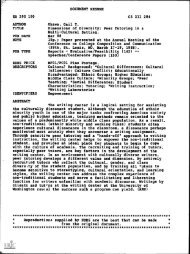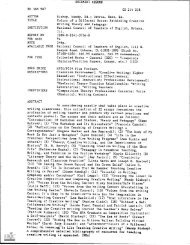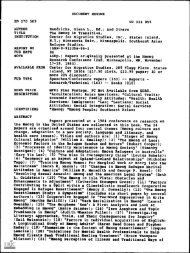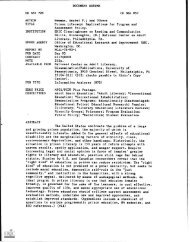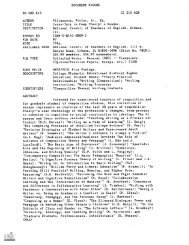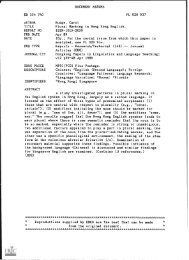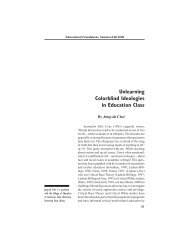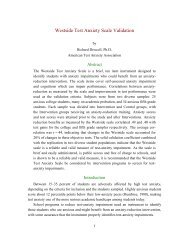- Page 1 and 2: DOCUMENT RESUMEED 295 549 HE 021 48
- Page 3 and 4: International Institute for Educati
- Page 5 and 6: ContentsPrefaceAcknowledgements1 In
- Page 7 and 8: esponsibility of the higher-educati
- Page 9 and 10: 1 Introduction: The Situation, the
- Page 11 and 12: The situation, the project and the
- Page 13 and 14: 7 he situation, the project and the
- Page 15 and 16: The, situation, the project and the
- Page 17 and 18: The situation, the project and the
- Page 19 and 20: The situation, the project and the
- Page 21 and 22: The situation, the project and the
- Page 23 and 24: The situation, the project and tne
- Page 25 and 26: The methodology used4 What are the
- Page 27 and 28: The methodology usedareas listed ab
- Page 29 and 30: The methodology used(c)(d)(e)given
- Page 31 and 32: The methodology usedand the partici
- Page 33 and 34: The methodology usedFrom this cross
- Page 35 and 36: The methodology usedsampled; they w
- Page 37 and 38: The methodology usedIlocos and Caga
- Page 39 and 40: The methodology usedstudents who di
- Page 41 and 42: 3 The Demand for Higher EducationIn
- Page 43 and 44: The demand for higher educationtial
- Page 45: Table 2. First-year students and gr
- Page 49 and 50: The demand for higher educationacco
- Page 51 and 52: The demand for higher educationTabl
- Page 53 and 54: The demand for higher educationTabl
- Page 55 and 56: By guardian'sincomeLess than kS 250
- Page 57 and 58: The demand for higher educationengi
- Page 59 and 60: Table 10:Desirability coefficient'
- Page 61 and 62: The demand for higher educationNote
- Page 63 and 64: Organization and access to higher e
- Page 65 and 66: Organization and access to higher e
- Page 67 and 68: Organization and access to higher e
- Page 69 and 70: Organization and access to higher e
- Page 71 and 72: Organization and access to higher e
- Page 73 and 74: Organization and access to higher e
- Page 75 and 76: Organization and access to higher e
- Page 77 and 78: Organization and access to higher e
- Page 79 and 80: Organization and access to higher e
- Page 81 and 82: Organization and access to higher e
- Page 83 and 84: 5 The Quantitative Development ofHi
- Page 85 and 86: The quantitative development of hig
- Page 87 and 88: The quantitative development of hig
- Page 89 and 90: The quantitative development of hig
- Page 91 and 92: 7.0Growth rate (%) 1970-1975 11.719
- Page 93 and 94: Oceania 1950 108.7 9.9 14.0 5.6 281
- Page 95 and 96: The quantitative development of hig
- Page 97 and 98:
Table 7:Enrolment in third level (i
- Page 99 and 100:
The quantitative development of hig
- Page 101 and 102:
Tlte (mown; ire dereIopment of high
- Page 103 and 104:
The operation of the higher educati
- Page 105 and 106:
The operation of the higher educati
- Page 107 and 108:
The operation cf the higher educati
- Page 109 and 110:
The operation of the higher (qualif
- Page 111 and 112:
The operation of the higher educati
- Page 113 and 114:
The operation of the higher educati
- Page 115 and 116:
The operation of the higher educati
- Page 117 and 118:
The operation of the higher educati
- Page 119 and 120:
7 Transition from the World ofHighe
- Page 121 and 122:
Transition from the world of higher
- Page 123 and 124:
Transition from the world of higher
- Page 125 and 126:
Transition from Me world of higher
- Page 127 and 128:
Transition from the world of higher
- Page 129 and 130:
Transition from the world of higher
- Page 131 and 132:
Transition from the world of higher
- Page 133 and 134:
Transition from the world of higher
- Page 135 and 136:
Table 9:Percentage of graduates in
- Page 137 and 138:
Transition from (1w world of higher
- Page 139 and 140:
Transition from the world of higher
- Page 141 and 142:
Transition from the world of higher
- Page 143 and 144:
Transition from the world of higher
- Page 145 and 146:
Transition from the world of higher
- Page 147 and 148:
Transition from the world of higher
- Page 149 and 150:
Transition from the world of higher
- Page 151 and 152:
The world of workIn another survey
- Page 153 and 154:
The world of workTable 2:Indone.sta
- Page 155 and 156:
The world of workgreat, although wo
- Page 157 and 158:
The world of workTable 6.Average sc
- Page 159 and 160:
The world of workTable 8. Order of
- Page 161 and 162:
The world of workGermany. In fact,
- Page 163 and 164:
The world of workreason for changin
- Page 165 and 166:
The world of workTable 10:Reasonsfo
- Page 167 and 168:
The world of workThe industry in wh
- Page 169 and 170:
Table 1.3. Percentage distribution
- Page 171 and 172:
The world of workimportance is the
- Page 173 and 174:
The world of workper cent considere
- Page 175 and 176:
The world of workTable 19:Assessmen
- Page 177 and 178:
The world of workTable 21: Distribu
- Page 179 and 180:
The world of workTable 24:Necessity
- Page 181 and 182:
The world of workcombination of job
- Page 183 and 184:
The world of workvery important for
- Page 185 and 186:
The world of worknot without its pr
- Page 187 and 188:
The world of workTable 35: Monthly
- Page 189 and 190:
The world of workparental income. H
- Page 191 and 192:
Conclusions: Implications for highe
- Page 193 and 194:
Conclusions: Implications for highe
- Page 195 and 196:
Conclusions: Implications for highe
- Page 197 and 198:
Conclusions: Implications for highe
- Page 199 and 200:
Conclusions: Implications for highe
- Page 201 and 202:
Conclusions: Implications for highe
- Page 203 and 204:
Conclusions: Implications for highe
- Page 205 and 206:
Conclu8.,,ns: Implications for high
- Page 207 and 208:
APPENDIX IStatistical profile of co
- Page 209 and 210:
APPENDIX IITables of variablesTable
- Page 211 and 212:
Table I:Lid of variables and types
- Page 213 and 214:
Table 1:List of variables and types
- Page 215 and 216:
Table 1:List of variables and typ6.
- Page 217 and 218:
AppendicesTable 4.Summary /1st of c
- Page 219 and 220:
AppendicesTable 6:Quasi-causal conc
- Page 221 and 222:
AppendicesTable 7:Quasi-causal conc
- Page 223 and 224:
AppendicesTable 8.Quasi-causal conc
- Page 225 and 226:
AppendicesTable 8.Quasi-causal conc
- Page 227 and 228:
Appendices.Humanistic professional
- Page 229 and 230:
Appendices33. What is the highest l
- Page 231 and 232:
AppendicesHelpful to others andsoci
- Page 233 and 234:
AppendicesInstitute of FinanceManag
- Page 235 and 236:
Appendices(b)personal talents 0In w
- Page 237 and 238:
Appendices30. (a) Indicate your gua
- Page 239 and 240:
AppendicesMarital statusOthers (spe
- Page 241 and 242:
AppendicesTime for familyand hobbie
- Page 243 and 244:
AppendicesA30A31A32A33Cooks, domest
- Page 245:
Books from Falmer PressLondon, New




